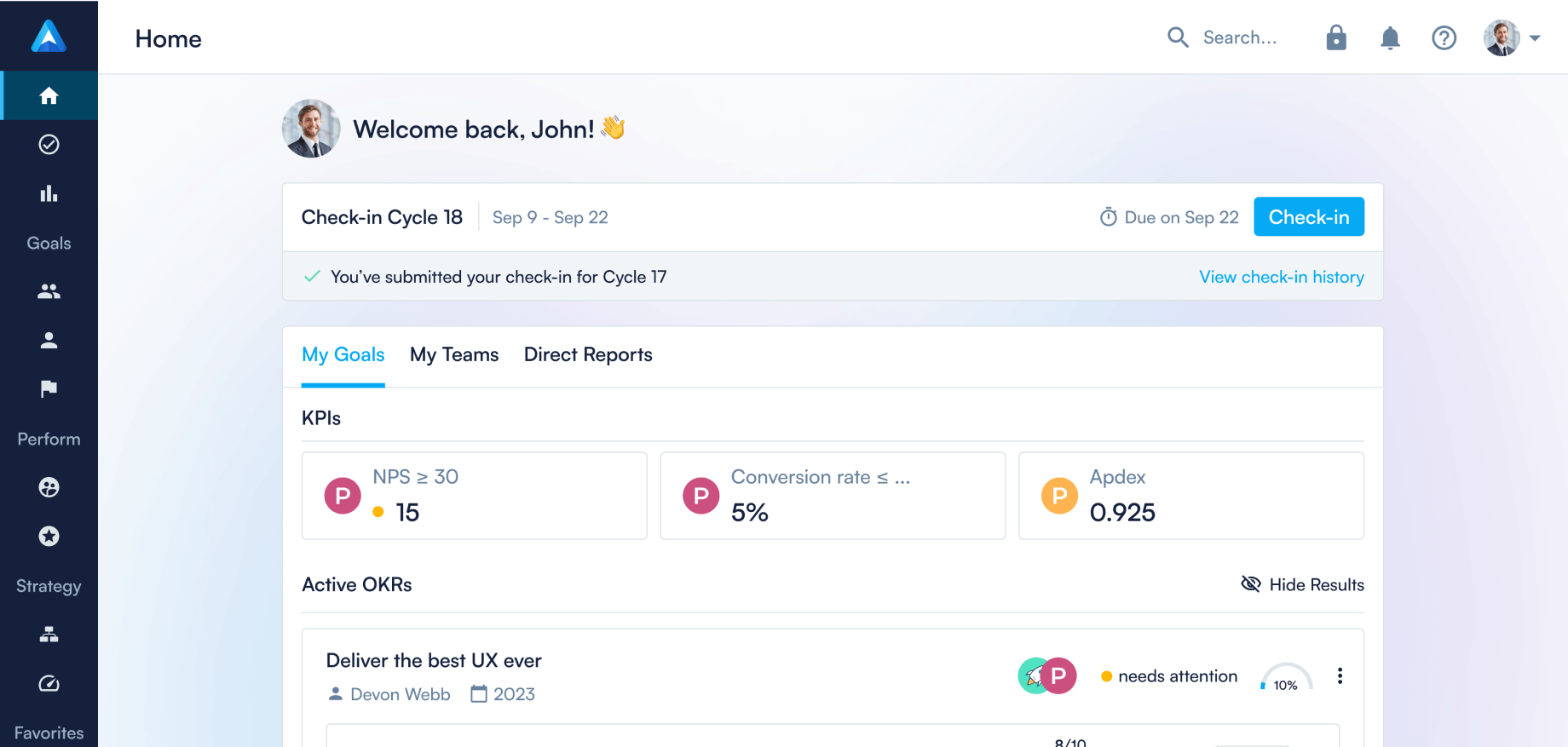
Goals are the most important ingredient for success

Our CEO was interviewed by Deutsche Startups last week. The original interview was published in German here. This article is the English translation of that interview.
Deutsche Startups:
How would you explain Perdoo to your grandma?
Henrik-Jan:
“Remember grandma, how dad was always struggling with those paper roadmaps when on holiday in Italy? Every time, he struggled to figure out where we were and how to get to our destination. Can you also remember how Google Maps did the trick and showed us all how best to get to our holiday destination, where to turn left and right? Well, Perdoo is kind of like Google Maps for businesses.”
I’d have to replace Google Maps with TomTom for my grandma to understand the analogy, but I’m afraid your readers may not understand it anymore ;)
Put differently: Perdoo helps companies turn great strategies into amazing results. We always take the ultimate goal of a business as the starting point. We help them build a clear roadmap towards it, enable them to identify the right goals to get there, and keep them on track with their progress towards it.
Deutsche Startups:
Has your concept changed in any way since the launch?
Henrik-Jan:
Absolutely. It took us a while to figure out what it is that we’re specifically doing and who we’re doing it for. For example we learned that goals (like OKRs) are not about the employee but about the business. As a consequence, goals are not the responsibility of HR, but of the executives and managers. Once we were clear who we’re doing it for, we started optimizing our product for executives.
Our business model has also changed. A few weeks ago, we launched a free version of our software. Most of our content was already free. By making our software free as well, we’ll enable any organization to use goals to effectively realize their ambitions.
Deutsche Startups:
How did the idea for Perdoo come about?
Henrik-Jan:
While working as a management consultant, I realized that many organizations fail to achieve the results they desire. I learned first-hand that goals bridge the gap between today’s reality and a desired future, and are a powerful tool to focus, align, and engage the organization. I love goals and believe they’re the most important ingredient of success. Efficiency is overrated—making sure you’re working on the right things is a million times more important.
Because there weren’t any good goal management softwares for businesses, Jonathan Morrice and I decided to start Perdoo.
Deutsche Startups:
How exactly does your business model actually work?
Henrik-Jan:
Our offering consists of two tiers: a free tier and a (paid) premium tier.
We carefully evaluated what functions are indispensable for companies that run on OKR, and included these (must-have) features in our free plan. On top of that, we decided to also include unlimited users and goals.
Our paid premium tier offers more advanced features such as visualisations, custom reports and dashboards. Another revenue stream is the coaching services we offer next to our software.
Deutsche Startups:
In 2015 the Berlin Company-Builder Makers invested in Perdoo. Was further venture capital never a topic for you?
Henrik-Jan:
We chose not to get addicted to venture capital and build a sustainable business instead. From day one, we made cash flow a priority. For example, we implemented annual upfront billing after welcoming our tenth customer. Yes, you scare off a significant number of organizations, but more than enough organizations were fine with paying us annually upfront. This prevented us from running from one fundraising round to the other, and enabled us to focus fully on our customers, helping them deliver their strategies.
Deutsche Startups:
What would you advise other founders who decide to go for bootstrapping?
Henrik-Jan:
Fundraising is a means to an end (though for many founders it seems an end in itself). Not every company can be bootstrapped, and not all growth targets can be met without venture capital. You must first understand your market and then decide whether or not to bootstrap.
If you can bootstrap, do it. Building a bootstrapped company is the champions league of company-building.
Bootstrapping is all about optimizing cashflow. That means optimizing both your cash inflow as well as your cash outflow. To optimize cash inflow, we implement for example annual upfront payments. To optimize our cash outflow, we did (and still do) quarterly reviews of all our costs.The better you´re able to do this, the faster you´re able to grow, since bootstrapping equals growth without external inputs (ie, funding).
Deutsche Startups:
How exactly has Perdoo developed since its foundation?
Henrik-Jan:
We are very happy with the strong development of our business. Since launching in 2015, Perdoo has acquired customers in 34 countries, across all continents. Among them are great firms such as WeTransfer, OneWeb, Rewe Digital and Flaconi.
We’re growing at an average rate of 300% year over year (based on revenues) and already over 1 million goals have been tracked through our platform. We are very proud of having built a profitable, cash flow-positive business without using venture capital.
Despite our growth, we’ve chosen to keep our core team small. We believe small teams are happier and more effective. So we outsource every function that doesn’t offer a strategic competitive advantage. For example, we don’t believe in paid search as a channel but content marketing is extremely important to us. Hence we’ve outsourced paid search to an agency but would never outsource content marketing.
Deutsche Startups:
Please take a look back: What has really gone wrong in the past years?
Henrik-Jan:
One of the best things as an entrepreneur is that you get to pick your own team. That’s really hard if you’ve never done it before. As a first-time entrepreneur, I’ve learned the hard way how to build a good team. Some of our earlier hires weren’t a good fit, which negatively affected the speed of development during the first 2-3 years.
To be clear: a bad hire doesn’t say anything about the employee. It only means that the employee isn’t a good fit for the position. In our case, that was because we often hired people before we had a crystal clear understanding of what the position looked like. And if you don’t know what the position looks like, then you also can’t know what kind of person to look for. This is really, really bad. Bad for the company, but also for the person that you’ve hired. I’m glad to say we’ve gotten a lot better at this!
Deutsche Startups:
And where have you done everything right so far?
Henrik-Jan:
Content marketing. We’ve focused on content marketing from day one and the investments that we’ve made in that area paid off big time. We acquire thousands and thousands of leads each year and, till date, have spent €0 on advertizing.
Content is great because content pieces are like assets. They generate leads now, but can also generate leads several years into the future. Paid acquisition, on the other hand, is shit. The moment you stop paying, you’ll stop acquiring leads. Paid acquisition is tempting because it’s relatively simple, but it’s definitely not a good long-term investment.
Deutsche Startups:
Where will Perdoo be in one year?
Henrik-Jan:
We expect our strong, sustainable growth to continue over the next few years. Every organization needs a strategy and that strategy needs to be delivered. It’s the responsibility of the executives to do so and if they fail, the shareholders will start looking for someone who can. More and more executives realize now that there actually is a solution, that Perdoo helps them meet or beat the expectations.
FAQ
Continue reading...


Why you shouldn’t outsource OKR to HR


How to embed goals in performance reviews







